04.英汉语言对比与翻译_讲义
- 格式:pdf
- 大小:1.45 MB
- 文档页数:12

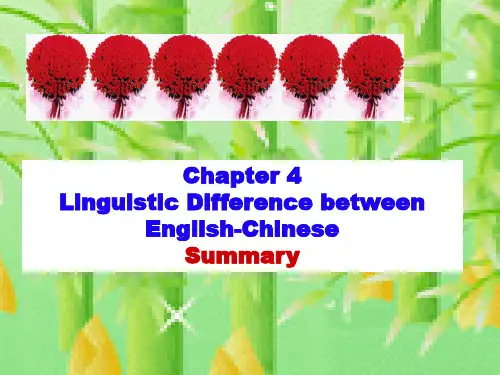
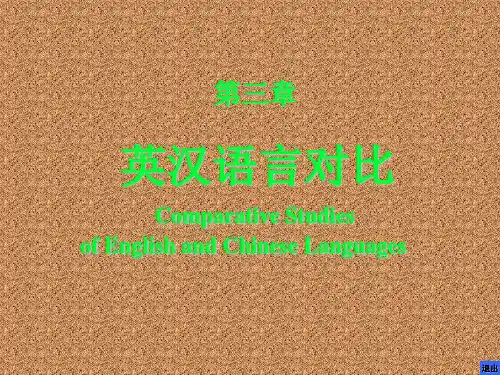
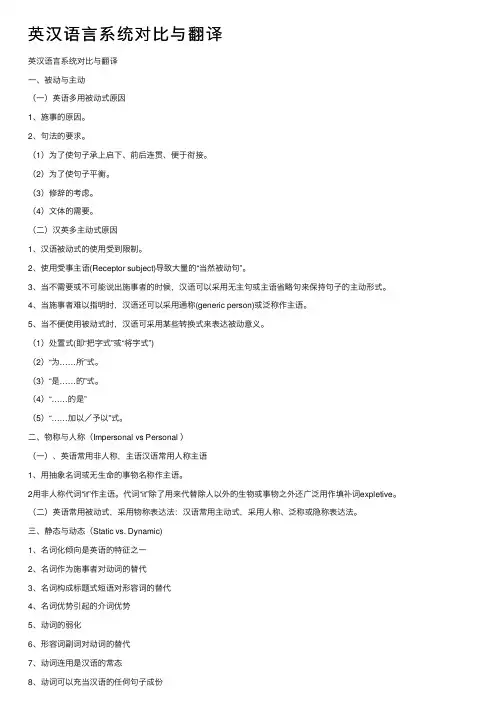
英汉语⾔系统对⽐与翻译英汉语⾔系统对⽐与翻译⼀、被动与主动(⼀)英语多⽤被动式原因1、施事的原因。
2、句法的要求。
(1)为了使句⼦承上启下、前后连贯、便于衔接。
(2)为了使句⼦平衡。
(3)修辞的考虑。
(4)⽂体的需要。
(⼆)汉英多主动式原因1、汉语被动式的使⽤受到限制。
2、使⽤受事主语(Receptor subject)导致⼤量的“当然被动句”。
3、当不需要或不可能说出施事者的时候,汉语可以采⽤⽆主句或主语省略句来保持句⼦的主动形式。
4、当施事者难以指明时,汉语还可以采⽤通称(generic person)或泛称作主语。
5、当不便使⽤被动式时,汉语可采⽤某些转换式来表达被动意义。
(1)处置式(即“把字式”或“将字式”)(2)“为……所”式。
(3)“是……的”式。
(4)“……的是”(5)“……加以/予以”式。
⼆、物称与⼈称(Impersonal vs Personal )(⼀)、英语常⽤⾮⼈称,主语汉语常⽤⼈称主语1、⽤抽象名词或⽆⽣命的事物名称作主语。
2⽤⾮⼈称代词“it”作主语。
代词“it”除了⽤来代替除⼈以外的⽣物或事物之外还⼴泛⽤作填补词expletive。
(⼆)英语常⽤被动式,采⽤物称表达法:汉语常⽤主动式,采⽤⼈称、泛称或隐称表达法。
三、静态与动态(Static vs. Dynamic)1、名词化倾向是英语的特征之⼀2、名词作为施事者对动词的替代3、名词构成标题式短语对形容词的替代4、名词优势引起的介词优势5、动词的弱化6、形容词副词对动词的替代7、动词连⽤是汉语的常态8、动词可以充当汉语的任何句⼦成份9、汉语句⼦中的动词可重复重叠⼀、被动与主动(Passive vs.Active) 被动语态在英语⾥是⼀种常见的语法现象。
在某些⽂体中,使⽤被动句⼏乎成了⼀种表达习惯。
Baker 指出:“被动句促成了物称倾向,物称倾向也滋长了被动句”。
(⼀)英语多⽤被动式原因1、施事的原因。
⼈们表达思想的时候,通常使⽤主动句。

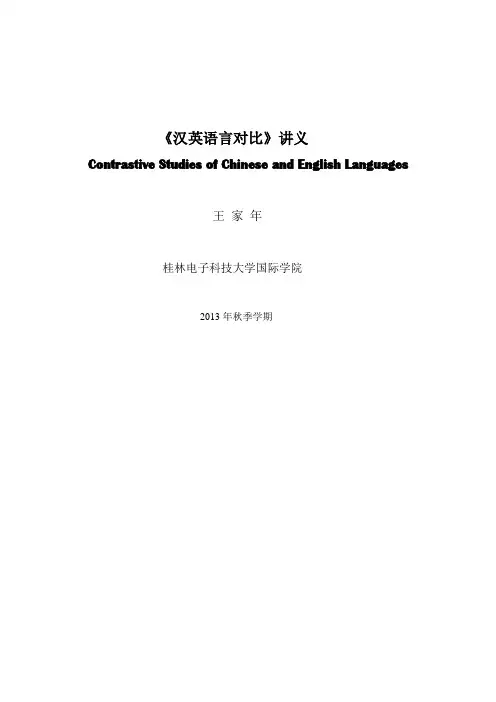
《汉英语言对比》讲义Contrastive Studies of Chinese and English Languages王家年桂林电子科技大学国际学院2013年秋季学期《汉英语言对比》讲义Contrastive Studies of Chinese and English Languages王家年2013年秋季学期课程介绍(Introduction to the Course)•主讲教师(Chief Course Instructor)王家年(PhD, Professor)•教学目的(Objectives)学习者通过本门课程的学习,①了解和掌握汉英语言对比的基本理论和方法;②能从宏观和微观两方面系统地分析汉语和英语在语音、词汇、语法、篇章、语用、修辞和语言文化方面的异同;③能应用汉英对比的方法开展汉语国际教育(对外汉语教学)研究、翻译研究和汉语本体研究。
•教学方法(Teaching Methods)以主题教学法(Theme-based Approach/Thematic Approach)、探究式学习法(Inquiry Learning Method)为主,辅以以知识信息传递为目的、多媒体课件为手段的讲授法(Expository Method)。
•考核方式(Evaluation Modes)①平时成绩(30%)+期末考试成绩(70%);②期末考试在“课程论文”和“综合试卷”中任选一种。
•开课学期与学时(Semester & Periods)第七学期(the Seventh Semester),32学时(32 credit hours)。
•教材及参考书目(Textbook & References)教材:潘文国.《汉英语言对比概论》,北京:商务印书馆,2013.参考书目:许余龙.《对比语言学》,上海:上海外语教育出版社,2002.何善芬.《英汉语言对比研究》,上海:上海外语教育出版社,2002.第一章导论(Prolegomena)•本章主题(Themes in this chapter):I. 比较语言学与对比语言学考辨II. 西方对比语言学的历史沿革III. 汉英语言对比:内容和方法IV. 汉英语言对比在外语教学中的学术地位(理论意义与实践意义)(注:通读教材、查阅文献,任选一个题目完成3000字以上的小论文,或能就你最熟悉的一个专题开展交流和讨论)•汉英语言对比的三层次(Levels in this course):汉英语言对比在我国是一个发展比较成熟的学科,它对不同的培养对象提出了不同的培养目标和要求,大体可以分为初中高三个层次,分别适应本科生阶段、研究生阶段和博士生阶段的学习。

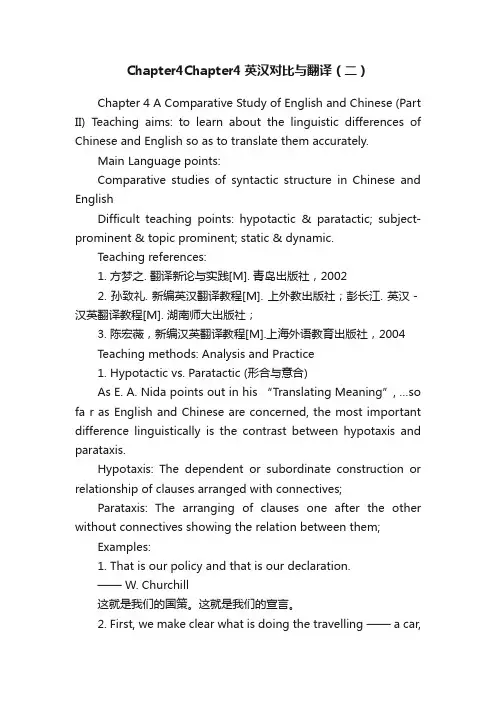
Chapter4Chapter4英汉对比与翻译(二)Chapter 4 A Comparative Study of English and Chinese (Part II) Teaching aims: to learn about the linguistic differences of Chinese and English so as to translate them accurately.Main Language points:Comparative studies of syntactic structure in Chinese and EnglishDifficult teaching points: hypotactic & paratactic; subject-prominent & topic prominent; static & dynamic.Teaching references:1. 方梦之. 翻译新论与实践[M]. 青岛出版社,20022. 孙致礼. 新编英汉翻译教程[M]. 上外教出版社;彭长江. 英汉-汉英翻译教程[M]. 湖南师大出版社;3. 陈宏薇,新编汉英翻译教程[M].上海外语教育出版社,2004Teaching methods: Analysis and Practice1. Hypotactic vs. Paratactic (形合与意合)As E. A. Nida points out in his “Translating Meaning”, …so fa r as English and Chinese are concerned, the most important difference linguistically is the contrast between hypotaxis and parataxis.Hypotaxis: The dependent or subordinate construction or relationship of clauses arranged with connectives;Parataxis: The arranging of clauses one after the other without connectives showing the relation between them;Examples:1. That is our policy and that is our declaration.—— W. Churchill这就是我们的国策。
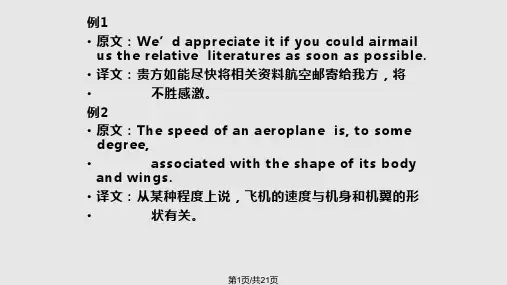

第四章英汉语言对比与翻译Fiona Ma April, 201221. 英汉语言特点2. 英汉语言特点对 翻译的启示3. 课堂互动及课后练习英汉语言对比与翻译1.英语重形合,汉语重意合2.英语偏静态,汉语偏动态3.英语重抽象,汉语重具体4.英语重物称,汉语重人称5.英语重被动,汉语重主动6.英语多替换,汉语多重复7.英语重后饰,汉语重前饰8.英语重聚焦,汉语重流散9.英语重时体,汉语轻时体1. 英汉语言特点返回章重点 4例1: Children will play with dolls equipped withpersonality chips, computers with in-built personalities will be regarded as workmates rather than tools, relaxation will be in front of smell television, and digital age will have arrived.【译文】儿童将与装有个性芯片的玩具娃娃玩耍,具有个性内置的计算机将被视为工作伙伴儿不是工具,人们将在气味电视前休闲,这时数字时代就来到了。
例2: 早知今日,何必当初?【译文】If I had known it would have come to this, I would have acted differently.1.1 英语重形合,汉语重意合1. 英汉语言特点返回章重点 5例3: As we lived near the road, we oftenhad the traveler or stranger visit us to taste our gooseberry wine, for which we had great reputation, and I confess, with the veracity of an historian that I never knew one of them to find fault with it.【译文】我们就住在路边。
过路人或外乡人常到我们家,尝尝我们家酿的酸果酒。
这种酒很有名气。
我敢说,尝过的人,从来没有挑剔过。
我这话像历史学家的话一样靠得住。
1.1 英语重形合,汉语重意合1. 英汉语言特点返回章重点 6例4: Poor acoustics spoilt the performance.【译文】音响效果不好,演出大为逊色。
例5: A little of everything and nothing at all. 【译文】如果什么事情都是浅尝辄止;终将一事无成。
例6: Admonish your friends in private, praise them in public.【译文】在私底下要忠告你的朋友,而在公共场合则要表扬你的朋友。
1.1 英语重形合,汉语重意合1. 英汉语言特点返回章重点 7 例1: The doctor’s extremely quick arrivaland uncommonly careful examination of the patient brought about his very speedy recovery.例2: I am afraid of you misunderstandingme.1.2 英语偏静态,汉语偏动态1. 英汉语言特点返回章重点 8例3: 我带这些外国游客去那座古庙看看。
【译文】I’ll show these foreign tourists around the ancient temple.例4: 晚上我请你出去吃饭。
【译文】I’ll invite you to dinner tonight.1.2 英语偏静态,汉语偏动态1. 英汉语言特点返回章重点 9例1: The absence of intelligence is anindication of satisfactory developments. 【译文】没有消息就表明有令人满意的进展。
例2: I bought the thinnest vestments Icould find, also a heavy one with a warm top coat, because I would encounter extremes of weather.【译文】我知道我会碰到最冷和最热的天气,所以我买了一套所能物色到的最薄的衣服,还买了一套带暖和大衣的厚衣服。
1.3 英语重抽象,汉语重具体1. 英汉语言特点返回章重点 10例1: Bitterness fed on the man who hadmade the world laugh.【译文】这位曾给全世界带来笑声的人自己却饱尝辛酸。
例2: An idea suddenly struck me.【译文】我突然想到一个主意。
例3: The little chap’s good -natured honestface won his way for him.【译文】这小伙子长相老实,看上去脾气也好,到处都有人缘。
1.4 英语重物称,汉语重人称1. 英汉语言特点返回章重点 11例1: I was astounded that he was preparedto give me a job.【译文】他准备给我一份工作,这使我大吃一惊。
例2: New actions must be taken to preventair pollution.【译文】必须采取新型的来阻止空气污染。
1.5 英语重被动,汉语重主动1. 英汉语言特点返回章重点 12例1: John speaks Chinese, and that verywell.【译文】约翰会讲汉语,而且讲得很好。
例2: The monkey’s most extraordinaryaccomplishment was learning to operate a tractor. By the age of nine, the monkey had learned to solo on the vehicle.【译文】这只猴子最了不起的成就就是学会了驾驶拖拉机。
到九岁的时候,这只猴子已经学会单独表演驾驶拖拉机了。
1.6 英语多替换,汉语多重复1. 英汉语言特点返回章重点 13例1: It is a good plan to imagine an argumentwith a person having a different bias.【译文】借助于想象与持不同偏见的人进行辩论,是一个很好的办法。
例2: It may be … a low -lying arid stretch withmiles of white sandy beach, and no sign of people, very bleached and barren.【译文】那可能是……地势低洼、连绵数英里、人迹罕至、荒芜贫瘠的白色干旱沙漠。
1.7 英语重后饰,汉语重前饰1. 英汉语言特点返回章重点 14例3: Tragedies can be written in literature sincethere is tragedy in life.【译文】生活中既然有悲剧,文学作品就可以写悲剧。
1.7 英语重后饰,汉语重前饰1. 英汉语言特点返回章重点 15 例如: Tradition has it that the island-citywas founded in A. D. 451 when Coast-dwelling people called the Venetti fled across the lagoon before advancing Hun Barbarians.【译文】传说这座岛城是公园451年建立的。
那时候,野蛮的匈奴人步步逼近。
居住在沿岸的那些被称为威尼替的民族,在匈奴人来到之前就逃过了环礁湖。
1.8 英语重聚焦,汉语重流散1. 英汉语言特点返回章重点 16例如: It has often been noted that those wholive, or have lived, in the shadow of death bring a mellow sweetness to everything they do.【译文】一个经常被提及的事情是,大凡生活或曾经生活在死亡阴影里的人对他所干的事情都饶有兴趣。
1.9 英语重时体,汉语轻时体1. 英汉语言特点1) This is something I admire so much, something I find so profound, so beautiful, so piercing that I must make you understand and admire it too, even though you, through some inadvertence, have neglected to learn the language in which it is written. Let me show you how it goes.【译文】这作品是多么深刻、美丽、扣人心弦,令我赞叹不已,恨不得能让你们大家一起享受,虽然你们不巧不懂原文,无以欣赏原作。
让我来告诉你们原作是怎么回事。
请翻译下列语句或语段,注意英汉语言差异在翻译中的运用(4x25=100):2. 英汉语言特点对 翻译的启示2) He who imagines he can do without the world deceives himself much; but he who fancies the world cannot do without him is still more mistaken.【译文】如果有人想象他可以不要旁人独自生活,那是在欺骗自己;如果有人幻想旁人离开他不行,那就是错上加错。
3) One unclean rag was about me, my hair a blacktangle; no doubt my discoverers thought me a madman.【译文】我身上围着一块肮脏的布片,头发纠结成了黑色的一团,发现我的人肯定会以为我是个疯子。
请翻译下列语句或语段,注意英汉语言差异在翻译中的运用(4x25=100):2. 英汉语言特点对 翻译的启示4) The isolation of the rural world, because of distance and the lack of transport facilities, is compounded by the paucity of the information media.【译文】由于距离远,又缺乏交通工具,农村社会便与外界隔绝,而这种隔绝,又由于通讯工具不足而变得更加严重。